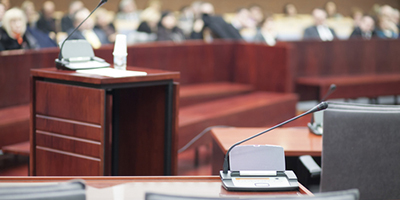News
In This Section
-
 AIPLA Files Comments on China’s Draft Provisions Prohibiting Abuse of Intellectual Property Rights to Exclude or Restrict Competition
AIPLA Files Comments on China’s Draft Provisions Prohibiting Abuse of Intellectual Property Rights to Exclude or Restrict Competition
August 24, 2022
Arlington, VA. August 24, 2022 - The American Intellectual Property Law Association (AIPLA) filed comments on Draft Provisions Prohibiting Abuse of Intellectual Property Rights to Exclude or Restrict Competition issued by China’s State Administration for Market Regulation (Draft Provisions). The comments point out that AIPLA generally believes intellectual property rights (IPR) should not be enforced beyond their effective term limits, given the efficient market realities of portfolio licensing, but recommends the Draft Provisions explicitly permit parties to establish license agreements that license an entire portfolio of IPR, notwithstanding the fact that certain IPRs may expire or be found invalid during the term of an agreement. -
 AIPLA Files Brief In Support of Neither Party Regarding Order Setting Schedule for Director Review
AIPLA Files Brief In Support of Neither Party Regarding Order Setting Schedule for Director Review
August 5, 2022
On August 4, AIPLA filed an amicus brief in the two PTAB cases of OpenSky Industries, LLC, Patent Quality Assurance, LLC, and Intel Corporation v. VLSI Technology LLC, which USPTO Director Vidal has taken up to address what actions the USPTO Director should take when faced with assertions of an abuse of process or conduct that otherwise thwarts, as opposed to advances, the goals of the Office and/or the AIA. AIPLA’s brief argues that the review procedures implemented in these proceedings are adequate to address the rare instances of alleged abuse of process or alleged conduct contrary to the goals of the Office and/or the AIA. -
AIPLA Issues Statement on Senator Thom Tillis's Patent Eligibility Restoration Act of 2022
August 3, 2022
ARLINGTON, Virginia, August 3, 2022 - The American Intellectual Property Law Association (AIPLA) released the following statement on the Patent Eligibility Restoration Act of 2022 introduced by Senator Thom Tillis (R-NC): -
 AIPLA Comments to ACUS on Patent Small Claims Court
AIPLA Comments to ACUS on Patent Small Claims Court
July 13, 2022
On July 5, the American Intellectual Property Law Association (AIPLA) submitted comments as proposed by the Administrative Office of the US Courts on a potential small claims patent court or small claims patent proceeding and its impacts. AIPLA addressed nine proposed questions and will continue to study these issues. -
 AIPLA Comments on the USPTO in Response to the Interim Process for Director Review
AIPLA Comments on the USPTO in Response to the Interim Process for Director Review
July 13, 2022
On July 11, the American Intellectual Property Law Association (AIPLA) offered its initial views to the United States Patent and Trademark Office (“USPTO”) in response to the Interim Process for PTAB Director Review. AIPLA appreciates the USPTO’s focus on improving fairness to all parties and achieving greater consistency and predictability in these proceedings. -
 JOINT STATEMENT ON THE WTO's DECISION
JOINT STATEMENT ON THE WTO's DECISION
June 23, 2022
On June 23, AIPLA, along with the Intellectual Property Owners Association (IPO), Licensing Executives Society International (LESI), Licensing Executives Society USA & Canada, and the New York Intellectual Property Law Association (NYIPLA) issued a joint statement on the tentative the World Trade Organization's (WTO) decision regarding the proposed TRIPs waiver compromise. -
 AIPLA Asks Supreme Court to Address the Role of Transformativeness in the Copyright Fair Use Analysis
AIPLA Asks Supreme Court to Address the Role of Transformativeness in the Copyright Fair Use Analysis
June 20, 2022
AIPLA files a brief in Andy Warhol Foundation for the Visual Arts v. Goldsmith, a case that addresses the role of transformativeness in the copyright fair use analysis. -
 AIPLA Submits Comments to EPO on 2022 Revised Guidelines for Examination
AIPLA Submits Comments to EPO on 2022 Revised Guidelines for Examination
May 13, 2022
On April 8, AIPLA Submitted comments to the European Patent Office (EPO) on their revised 2022 Guidelines for Examination. AIPLA welcomes the current effort of the EPO to collect comments from stakeholders regarding changes to said Guidelines. We hope that our views will assist the EPO in its process of revising its Guidelines to benefit all stakeholders rather than place unnecessary burdens on them. -
 JOINT STATEMENT ON TENTATIVE TRIPS WAIVER COMPROMISE
JOINT STATEMENT ON TENTATIVE TRIPS WAIVER COMPROMISE
March 28, 2022
On March 24, AIPLA, along with the Intellectual Property Owners Association (IPO), Licensing Executives Society International (LESI), Licensing Executives Society USA & Canada, and the New York Intellectual Property Law Association (NYIPLA) issued a joint statement on the tentative TRIPs Waiver Compromise. -
 AIPLA Submits Comments to the USPTO Notice of the Deferred Subject Matter Eligibility Response Pilot Program.
AIPLA Submits Comments to the USPTO Notice of the Deferred Subject Matter Eligibility Response Pilot Program.
March 8, 2022
On March 7, AIPLA submitted comments on the recent USPTO Notice of the Deferred Subject Matter Eligibility Response Pilot Program. AIPLA provided a number of suggestions for the Office's consideration on improvements or clarifications to the pilot program. -
 Supreme Court Vacated and Remanded the Ninth Circuit’s decision in Unicolors, Inc. v. H&M Hennes and Mauritz, LP
Supreme Court Vacated and Remanded the Ninth Circuit’s decision in Unicolors, Inc. v. H&M Hennes and Mauritz, LP
February 24, 2022
On February 24, 2022 the U.S. Supreme Court Vacated and Remanded the Ninth Circuit’s decision in Unicolors, Inc. v. H&M Hennes and Mauritz, LP. This ruling is consistent with the amicus brief filed by AIPLA on August 10, 2021. -
670417cd91a54fe6b61408b343eee15b.png?sfvrsn=fea15870_0) AIPLA Submits Comments to US Copyright Office Pursuant to Notice of Proposed Rulemaking: Copyright Claims Board - Active Proceedings and Evidence
AIPLA Submits Comments to US Copyright Office Pursuant to Notice of Proposed Rulemaking: Copyright Claims Board - Active Proceedings and Evidence
February 10, 2022
On February 7, 2022, AIPLA submitted comments in response to the U.S. Copyright Office Notice of Proposed Rulemaking related to practice procedures before the Copyright Claims Board. AIPLA noted that the success of the CASE Act will turn in significant part on the simplicity and accessibility of the trial procedures. We commended the Office for its efforts to develop user-friendly Copyright Claims Board (“CCB”) procedures. AIPLA offered responses and comments to certain of the questions and rules raised by the Office in the Notice with regard to the management of parties; the management of the proceedings; discovery; evidence; hearings; and, post-determination proceedings. -
 AIPLA Submits Comments to the USPTO in Response to the Notice Regarding Trademarks Administrative Sanctions Process
AIPLA Submits Comments to the USPTO in Response to the Notice Regarding Trademarks Administrative Sanctions Process
February 10, 2022
On February 4, 2022, AIPLA submitted comments to the USPTO on the Request for Comment Regarding Trademarks Administrative Sanctions Process. AIPLA supports the implementation of an administrative sanctions process as proposed by the USPTO but seeks clarification and offers suggestions on a few points in the proposed process. -
 AIPLA Submits Comments to the US Department of Justice on Draft Policy Statement on Licensing Negotiations and Remedies for Standards-Essential Patents Subject to Voluntary F/RAND
AIPLA Submits Comments to the US Department of Justice on Draft Policy Statement on Licensing Negotiations and Remedies for Standards-Essential Patents Subject to Voluntary F/RAND
February 10, 2022
On February 4, 2022, AIPLA submitted comments to the United States Department of Justice on on Draft Policy Statement on Licensing Negotiations and Remedies for Standards-Essential Patents Subject to Voluntary F/RAND. AIPLA recommends the agencies leave the 2019 statement in place, however, provided some suggestions if the 2019 policy does not remain. -
 AIPLA Submits Comments to US Copyright Office Regarding Deferred Registration Examination Study
AIPLA Submits Comments to US Copyright Office Regarding Deferred Registration Examination Study
January 24, 2022
On January 24, 2022, the American Intellectual Property Law Association (AIPLA) submitted comments to the United States Copyright Office pursuant to the Notice of Inquiry related to the deferred registration examination study. The comments address perceived deficiencies in the current registration regime, benefits and drawbacks to offering a deferred examination option, legal or regulatory framework, filing fees, and more. -
 AIPLA Endorses Judge Leonard P. Stark for Circuit Judge of the United States Court of Appeals for the Federal Circuit
AIPLA Endorses Judge Leonard P. Stark for Circuit Judge of the United States Court of Appeals for the Federal Circuit
December 16, 2021
On December 16, 2021, the American Intellectual Property Law Association (AIPLA) submitted a letter to Chair Richard J. Durbin and Ranking Member Charles E. Grassley of the Senate Committee on the Judiciary in support of Judge Leonard P. Stark’s nomination of Circuit Judge of the United States Court of Appeals for the Federal Circuit. The letter outlined the Association’s White Paper (“Recommendations Regarding Nomination of Judges to the United States Court of Appeals for the Federal Circuit” dated September 2018), concluding that Judge Stark not only meets the criteria, but would bring essential experience to the Court. The letter provides an enthusiastic endorsement of Judge Stark, urging the Senate to move forward with his confirmation. -
 USPTO Indefinitely Delays Implementation of the Voluntary Continuing Legal Education (CLE) Certification
USPTO Indefinitely Delays Implementation of the Voluntary Continuing Legal Education (CLE) Certification
December 16, 2021
On December 16, 2021, The United States Patent and Trademark Office (USPTO) indefinitely delayed implementation of the voluntary continuing legal education (CLE) certification for registered patent practitioners and individuals granted limited recognition to practice before the USPTO in patent matters. The American Intellectual Property Law Association (AIPLA) assembled a joint committee task force to ensure that the proposed rules did not disproportionately impact patent agents and other practitioners for whom CLE self-certification would be a significant burden and/or legal risk, and to ensure that practitioners were made aware of requirements for the registration statement and the CLE self-certification. -
 AIPLA Submits Joint Letter to House of Representatives Expressing Concern Regarding Resource Appropriation for USPTO
AIPLA Submits Joint Letter to House of Representatives Expressing Concern Regarding Resource Appropriation for USPTO
December 6, 2021
On December 1, 2021, the American Intellectual Property Law Association (AIPLA) and the Intellectual Property Owners Association (IPO) submitted a joint letter to House Committee members Chair DeLauro, Ranking Member Granger, Chair Cartwright, and Ranking Member Aderholt expressing concern regarding resources appropriated to the U.S. Patent and Trademark Office (USPTO) in FY 2022. The joint letter urged the House to pass a funding measure that reflects the intent of the Leahy-Smith America Invents Act to fund the USPTO at a level equal to fee collection estimates. -
 AIPLA Urges Senate to Confirm Katherine (Kathi) Vidal as Under Secretary of Commerce for Intellectual Property and Director of the USPTO
AIPLA Urges Senate to Confirm Katherine (Kathi) Vidal as Under Secretary of Commerce for Intellectual Property and Director of the USPTO
November 30, 2021
On November 30, 2021, the American Intellectual Property Law Association (AIPLA) submitted a letter to Chair Richard J. Durbin and Ranking Member Charles E. Grassley of the Senate Committee on the Judiciary in support of Katherine (Kathi) Vidal’s nomination of Under Secretary of Commerce for Intellectual Property and Director of the United States Patent and Trademark Office (USPTO). The letter outlined components of the set of criteria that AIPLA used to address the needed qualifications for an individual appointed to serve as the leader of the USPTO, concluding that Ms. Vidal possesses such qualifications. -
 USPTO Announces Delay of Patent Filing Fee for Non-DOCX Applications
USPTO Announces Delay of Patent Filing Fee for Non-DOCX Applications
November 22, 2021
The United States Patent and Trademark Office (USPTO) issued a final rule to delay the effective date of the non-DOCX filing fee for an additional calendar year, until January 1, 2023. The fee adjustment would apply to any nonprovisional utility patent application filed under 35 U.S.C. 111, including any continuing application, that is not filed in DOCX format. The USPTO noted that this delay allows applicants additional time to adjust to filing patent applications in the new format and also enables the USPTO to conduct further testing of its systems. AIPLA was at the fore of expressing concern to the USPTO about requiring patent applications to be filed exclusively in a DOCX format, noting the potentially significant impact on its members and the system.

.png?sfvrsn=ee40cddd_2)